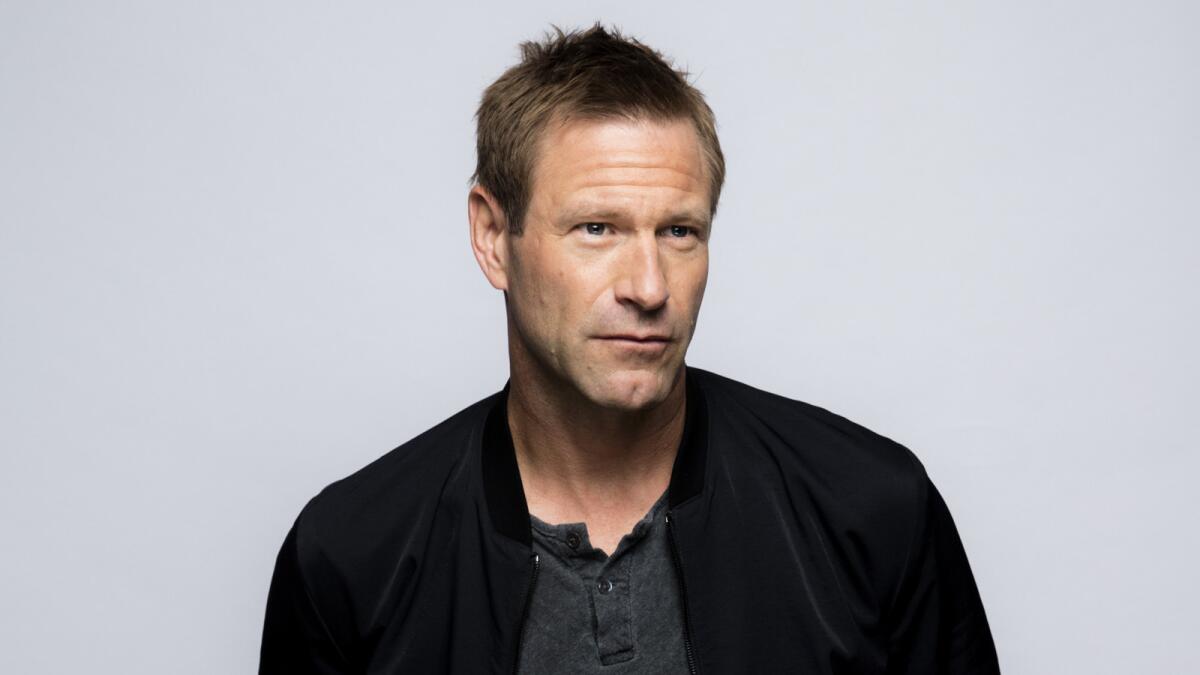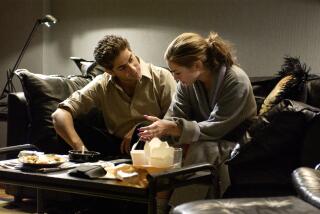With key roles in two acclaimed films, Aaron Eckhart revels in being out of actor jail

You don’t have to tell Aaron Eckhart that he’s been through something of a dry spell. He’s well aware that landing prominent roles in both Clint Eastwood’s “Sully” and Ben Younger’s “Bleed for This” is something that, as far as his career goes, comes along once every 10 years or so.
“The last time I had this situation, it was ‘The Dark Knight,’” the 48-year-old actor says. “I’ve been 20 years professionally in Hollywood and I’ve been through ups and I’ve been through downs. I have such a greater appreciation now for what it takes to be in this position in terms of having a critically acclaimed movie and a movie that performs in the box office, and so I’m just relishing it. I’m just having fun with it. I’m looking on Twitter. I would have never done that before.”

Miles Teller, Katey Sagal and Aaron Eckhart star in “Bleed For This.”
Both films find Eckhart portraying notable real-life figures. In the blockbuster “Sully” he was tasked with playing former U.S. Airways pilot Jeff Skiles, the first officer who assisted Capt. Chesley “Sully” Sullenberger (played by Tom Hanks) with a dramatic emergency landing on New York City’s Hudson River. As soon as Eckhart was cast he spoke to Skiles and asked questions that he admits seem pretty obvious but were incredibly important when researching the role.
“Did you think you were going to die? That’s what I think most people want to know,” Eckhart says. “How did you keep from dying and killing 155 people? The answer is ‘We didn’t think about that. We didn’t have time to think about that.’ It was complete instinct. It was complete training. These guys are drilled in this. They’d give their lives over that stuff.”
As much a hero as Sully himself, Skiles had to come to grips that he was never going to receive the same notoriety or media attention as his colleague. Of course, that provided a tiny window into his understanding of his character’s motivations.
Eckhart recalls, “He said, ‘Look, I never wanted to be a star. Even Sully didn’t want to be a star, but the media is going to make a star. It’s a heroic story. I’m not going to sit there and compete for it,’ and he faded out. Interestingly enough, when he saw the movie for the first time he said, ‘Oh, I didn’t know I was in the movie so much. I didn’t know I was that big a part of the movie.’”
While Eastwood’s “Sully” could make its mark this season with a number of key Academy Award nominations, including best picture and director among other categories, it’s Eckhart’s work in “Bleed for This” that is garnering him the most individual awards attention. He plays legendary boxing trainer Kevin Rooney in the drama centered on the remarkable professional comeback of Vinny Pazienza (Miles Teller) after a freak car accident 25 years ago. Eckhart bluntly admits at first he wasn’t interested because of the role’s physical requirements.
“Before I even got to them, I said, ‘No. I’m not doing this. I don’t want to get fat again.’ I’ve gained 45, 50 pounds twice in my career,” Eckhart says. “It’s no fun leading up and it’s no fun on the other end getting rid of it. I said no for a long time to my agent and she just kept on pushing me and kept on pushing me.”
Beyond the weight gain, Eckhart’s biggest fear was landing Rooney’s high Staten Island voice. He notes, “I was just like, ‘I can’t do that. I’m not an accent guy. I’m not in “Shakespeare in Love” and all that.’” It was meeting Rooney’s son that changed his perspective and allowed him to truly transform himself into the boxing guru.
“[He] told me about the mindset, trained me in the same way as his dad would have,” Eckhart says. “Everything that I’m training with Vinny in the movie was taught to me by Kevin Rooney Jr., and that wasn’t in the script. All that stuff that I’m doing, the way he looks and the way he responds to his fighter, that’s just Rooney.”
Eckhart’s biggest revelation after the back-to-back releases of “Bleed” and “Sully” is that whatever this new phase of his career turns out to be, the opportunities will be there.
“I have to come to grips with where I am in my life and where I am in my career, and how do I make a career out of that and be happy at the same time, and how to please critics, the audience, and still be artistically happy,” Eckhart says. “I would say, ‘Yeah, I haven’t had this for a while.’ I call myself being in prison for a while, and I feel like maybe I’ll get out of prison now.”
See the most read stories this hour »
More to Read
From the Oscars to the Emmys.
Get the Envelope newsletter for exclusive awards season coverage, behind-the-scenes stories from the Envelope podcast and columnist Glenn Whipp’s must-read analysis.
You may occasionally receive promotional content from the Los Angeles Times.







